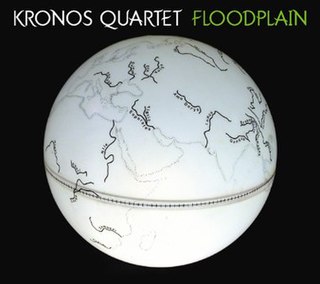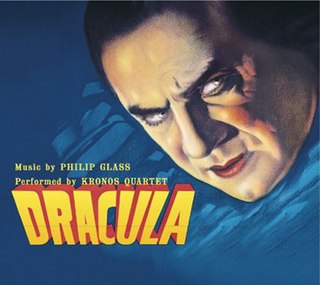
Terrence Mitchell "Terry" Riley is an American composer and performing musician best known as a pioneer of the minimalist school of composition. Influenced by jazz and Indian classical music, his work became notable for its innovative use of repetition, tape music techniques, and delay systems. His best known works are the 1964 composition In C and the 1969 album A Rainbow in Curved Air, both considered landmarks of minimalism and important influences on experimental music, rock, and contemporary electronic music. Subsequent works such as Shri Camel (1980) explored just intonation.

The Kronos Quartet is an American string quartet based in San Francisco. It has been in existence with a rotating membership of musicians for 50 years. The quartet covers a very broad range of musical genres, including contemporary classical music. More than 1,000 works have been written for it.
Ellen Fullman is an American composer, instrument builder, and performer. She was born in Memphis, Tennessee, and is currently based in the San Francisco Bay Area. She is known for her 70-foot (21-meter) Long String instrument, tuned in just intonation and played with rosin-coated fingers.

Morton Subotnick is an American composer of electronic music, best known for his 1967 composition Silver Apples of the Moon, the first electronic work commissioned by a record company, Nonesuch. He was one of the founding members of California Institute of the Arts, where he taught for many years.
Osvaldo Noé Golijov is an Argentine composer of classical music and music professor, known for his vocal and orchestral work.
Aleksandra Vrebalov is a Serbian-American composer based in New York City and Novi Sad, Serbia.

Pamela Z is an American composer, performer, and media artist best known for her solo works for voice with electronic processing. In performance, she combines various vocal sounds including operatic bel canto, experimental extended techniques and spoken word, with samples and sounds generated by manipulating found objects. Z's musical aesthetic is one of sonic accretion, and she typically processes her voice in real time through the software program Max on a MacBook Pro as a means of layering, looping, and altering her live vocal sound. Her performance work often includes video projections and special controllers with sensors that allow her to use physical gestures to manipulate the sound and projected media.
Raven Chacon is a Diné composer, musician and artist. Born in Fort Defiance, Arizona within the Navajo Nation, Chacon became the first Native American to win a Pulitzer Prize for Music, for his Voiceless Mass in 2022.
Gabriela Lena Frank is an American pianist and composer of contemporary classical music.

Nathaniel Stookey is an American composer and musician.

The discography of the Kronos Quartet includes 43 studio albums, two compilations, five soundtracks, and 29 contributions to other artists' records. The Kronos Quartet plays classical, pop, rock, jazz, folk, world and contemporary classical music and was founded in 1973 by violinist David Harrington. Since 1978, they are based in San Francisco, California. Since 1985, the quartet's music has been released on Nonesuch Records.

Laura Elise Schwendinger was the first composer to win the American Academy in Berlin's Berlin Prize.

Joan Jeanrenaud is an American cellist. A native of Memphis, Tennessee, she played with the Kronos Quartet from 1978 until 1999, when, after a sabbatical, she left to pursue a solo career and collaborations with other artists, in part due to being diagnosed with multiple sclerosis. She has staged and recorded solo performance pieces, playing the cello in tandem with electronic instruments. Her first solo album, Metamorphosis, was described by Greg Cahill in Strings as "visceral, hypnotic, and often compelling."

Floodplain is a studio album by the Kronos Quartet released in 2009. All twelve compositions were written or arranged for the quartet.

Dracula is a soundtrack performed by the Kronos Quartet, with music composed by Philip Glass, for the 1931 film Dracula.
David Aaron Jaffe is an American composer who has written over ninety works for orchestra, chorus, chamber ensembles, and electronics. He is best known for his use of technology as an electronic-music or computer-music composer in works such as Silicon Valley Breakdown, though his non-electronic music has also been widely performed. He is also known for his development of computer music algorithmic innovations, such as the physical modeling of plucked and bowed strings, as well as for his development of music software such as the NeXT Music Kit and the Universal Audio UAD-2/Apollo/LUNA Recording System.
Alexandra du Bois is an American composer, violinist and educator who has received international critical acclaim for her chamber, orchestral and vocal compositions. She currently lives in New York and Vermont.

Sahba Aminikia is an Iranian-born American contemporary music composer, artistic director, performer, and educator. Aminikia is the founder and the artistic director of Flying Carpet Festival, the first performing arts festival for children living in war zones.

Paul Wiancko is an American composer and cellist of the Kronos Quartet.
Aviya Kopelman is an Israeli composer and pianist.












